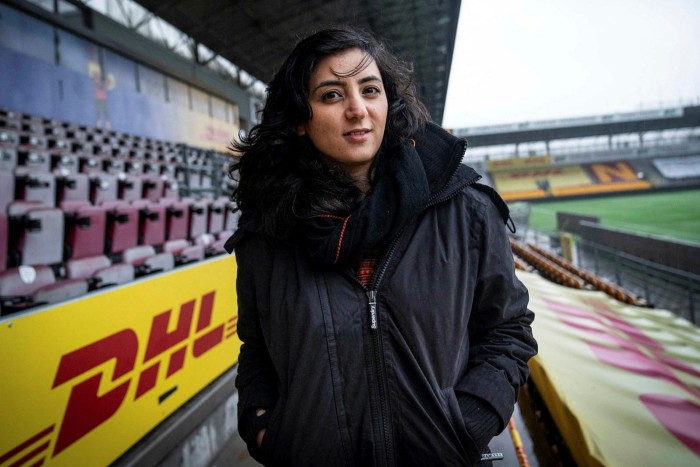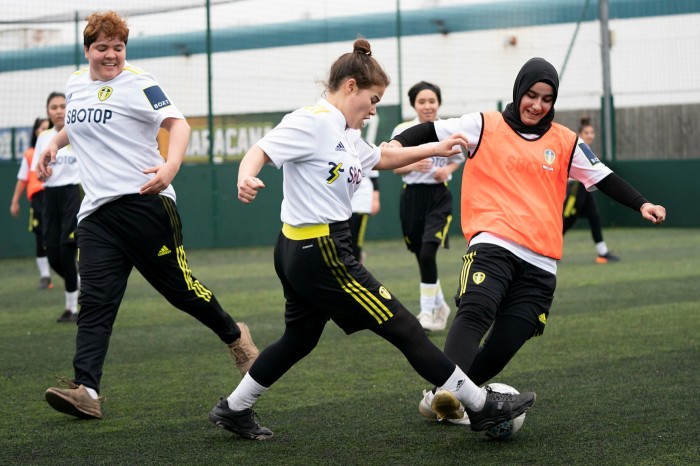Afghan female football champions enjoy new lease of life in England

Roula Khalaf, Editor of the FT, selects her favourite stories in this weekly newsletter.
The bus journey from Herat in western Afghanistan to the capital Kabul took the young female football squad past rocket blasts and firefights. They were close by when a suicide bomber detonated at the airport. At the border they endured beatings and the threat of being stoned.
But thanks to their courage, and the generosity of a diverse group of supporters from around the world, including Leeds United Football Club, some of the most talented athletes in Afghanistan escaped the Taliban and are finding new beginnings in England’s north.
Recounting their getaway, and what has happened since they landed at Stansted airport in November, the team veered collectively from laughter to tears — traumatised by their ordeal yet happy to have found new hope.

“We are so grateful for the opportunity to be here,” said Sosan, a midfield player from the Herat team, who were champions of the women’s league in Afghanistan.
“We can study again. We can play football freely. But we also feel so sad for those we have left behind,” she said, declining to give her surname to protect family back home.
The players’ experience is testament to how much has been lost to Afghanistan in recent months. The US-led military coalition that retreated when the Taliban returned to power, helped underpin greater freedoms for women over two decades. The flight of the young female footballers is indicative of how the potential they represented is moving far afield.
They were talking at a hotel — the whereabouts of which cannot be disclosed for security reasons — where UK authorities have temporarily housed them, along with members of their families at risk by association. They form a group of 131 who escaped together and whose number expanded by one this week, when a baby was born.
Three of the 28-strong squad had just been selected to play for the women’s national team when the Taliban’s takeover in August put paid to all their dreams.

Having used football as a platform to push the boundaries of what was possible for girls and women within their culture, the team, featuring players in their late teens and early twenties, were in grave danger. They were well-known and their faces were on posters across Herat.
“Our mothers and grandmothers told us that when the Taliban come we would no longer be able to go to school, we would not be able to complete our education. We would have to stay at home,” said Narguez, a defender.
“We thought all this hard work we had put in would end in nothing and football and our lives would stop forever,” she added. “People say if you are scared something is going to happen to you, it will.”
With encouragement from Khalida Popal, former captain and founder of the national women’s team, and now resident in Denmark, the team fled from Herat with close family and coaches, hoping to fly out of Kabul.
Among those Popal rallied was an orthodox rabbi, Moshe Margaretten from the Tzedek association in New York. He in turn reached out to Kim Kardashian, the US reality television personality, who funded the flight to Britain.

But the Taliban were already in Kabul. “There was shooting everywhere and it was chaos. The stuff we had seen on the way was difficult to digest and a lot of the group wanted to return home,” said Sabriah Nowroozi, the captain.
Later, after the team had taken a bus to the Pakistan border, Taliban fighters discovered from their papers that they were footballers.
“They said we were infidels trying to corrupt the people. We would either all be stoned to death or they would chase us out,” Nowroozi said. After hours cramped into a tight metal corridor, during which some of the women were beaten, they were allowed out.
All the time, behind the scenes and far away, an eclectic coalition was helping to facilitate their flight to safety spurred on by Popal, who was instrumental in the plans.
“The foundation that we built for women’s football in Afghanistan was to stand up for our rights in a male dominated society where women had barely any rights as human beings,” she said.
Andrea Radrizzani, the Italian entrepreneur who is chair and majority owner of Leeds United, was also central. He worked his contacts to get the team into Pakistan and brought his foundation, Play for Change, in to help finance their hotel bills.
He has also ensured that, once in the UK, the team’s football has stayed on track. They are training twice a week with Leeds, and the foundation is fundraising for them and seeking placements at UK clubs.

Radrizzani said he hoped some of them would play for his club. “They had never seen a football pitch with grass. They were so happy that they cried.”
Under the UK’s Afghan relocation and assistance policy, more than 7,000 people have been resettled in the UK since the Taliban seized power. A longer-term scheme, to give up to 20,000 people at risk a new life in the UK, is starting soon.
The group from Herat has been given visas for six months during which they will be eligible to apply for permanent residence in the UK. Teams of local officials are helping them set up bank accounts, connect telephones and register with health services. Hotel staff have helped.
But not everyone has been as welcoming.
“There was a fight and people were saying why are you here?” Nowroozi said, speaking of an incident with hostile locals reported to police the day before. She understood, from her own experience of Afghanistan, how people can be hostile to strangers. “We have to be patient,” she added.
Letter in response to this article:
Afghan women footballers have a message for the PM / From Keith Billinghurst, London SE9, UK
Comments